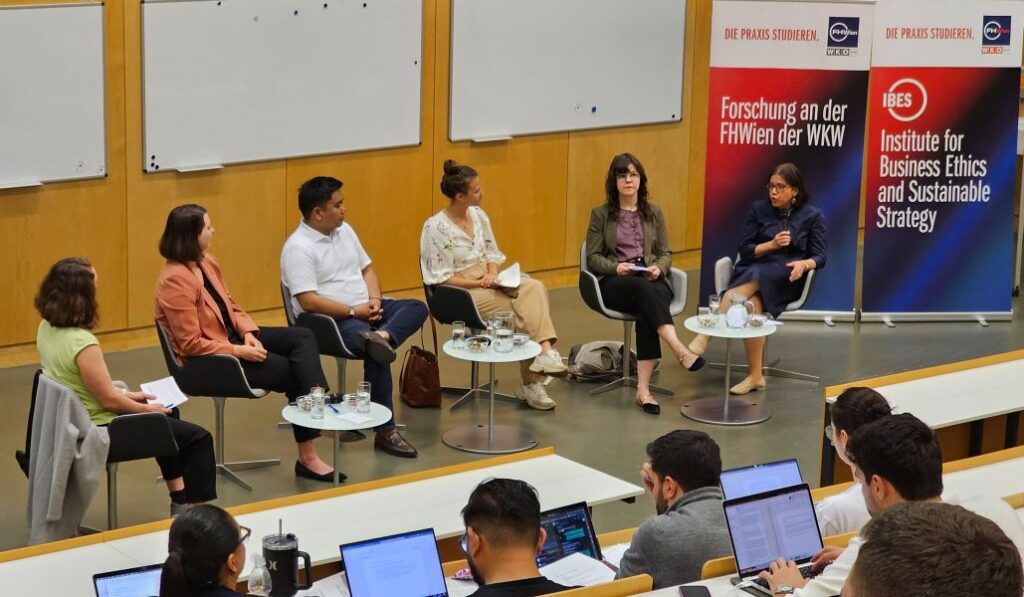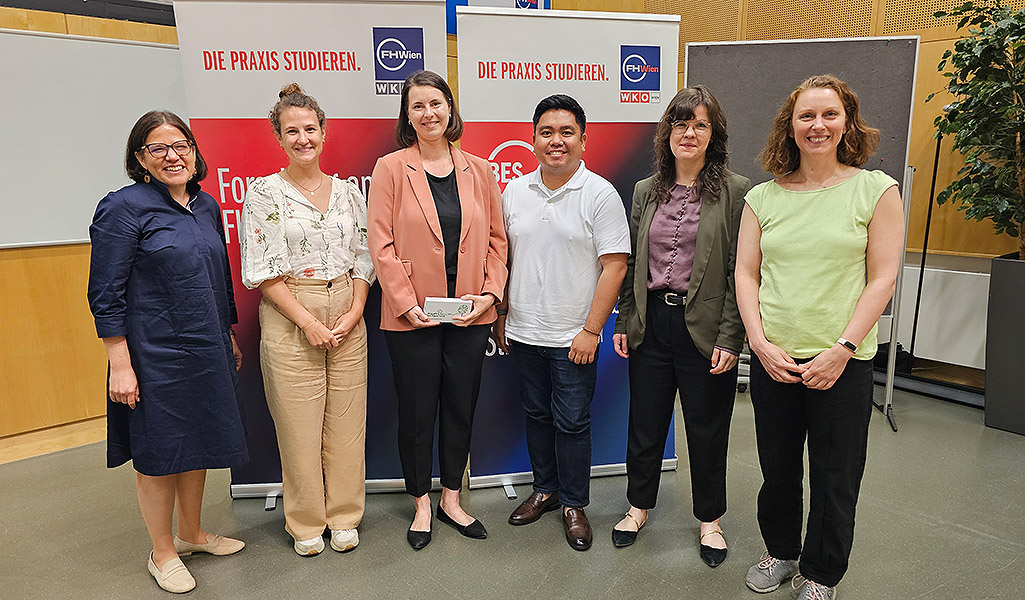On two evenings in May, experts and students from FHWien der WKW discussed the importance and effectiveness of multi-stakeholder initiatives (MSI) for a sustainable future as part of a lecture and panel discussion at the Responsible Management Lectures (RML) of the 2024 summer semester.
Ester Hennchen, researcher, lecturer and consultant in corporate responsibility and sustainable supply chain management from IESE Business School – Barcelona, outlined characteristics of “Grand Challenges” in the first RML of the semester using the example of climate change.
Grand challenges illustrated by climate change
These “grand challenges” appear overwhelming in their complexity, uncertainty and the multitude of possible variants. To counter these diverse risks, MSIs are necessary, as the “balanced scorecard of the earth” is on “red alert”. This warning must be a wake-up call for those who oversee the economy. Because companies are often not only the cause of but also the solution to the grand challenges of our time.
Multi-stakeholder collaborations between business, NGOs, governments and local initiatives have proven to be particularly effective in building trust and relationships, sharing knowledge, experimenting and engaging. However, there is still a lack of parameters for stakeholder accountability. According to Hennchen’s studies, this can be addressed by promoting transparency, dialog for more inclusion and monitoring effectiveness.
Daniela Ortiz, Head of Institute for Business Ethics and Sustainable Strategy (IBES) at FHWien der WKW, began the second RML by reviewing the characteristics of the “Grand Challenges”. As a participant in the panel discussion moderated by Katharina de Melo (IBES), she discussed various examples of successful MSIs with experts and addressed the challenges and success factors that are relevant to the successful implementation of these initiatives.
Practical examples of MSI from domestic companies
Norma Schönherr reported on the Austrian fiber manufacturer Lenzing AG, which is committed to sustainability both as an individual company and as part of MSI. For example, the company has developed new fibers for tarpaulins that reduce the melting of glaciers in the summer months. The used fibers no longer release microplastics and are recycled or reused in another form at the end of their lifespan. To achieve this, Lenzing AG worked together with partners from various sectors such as tourism associations, lift operators, research institutions, upcycling companies and artists.
Österreichische Post AG is also actively involved in MSI in order to achieve its sustainability goals. As an example, Marc Sarmiento cited the cooperation with Amazon as part of the “Climate Pledge”. The aim of this initiative is to decarbonize the supply chain and reduce greenhouse gas emissions. To reach this goal, Austrian Post has committed to running its fleet exclusively with electric vehicles by 2030.
Challenges and success factors of MSI
As an NGO, WWF supports companies in setting and achieving scientifically sound climate targets. Sabrina Peer reported on competitors who exchange ideas and learn from each other. One example of this is the WWF Climate Group, which Lidl and Spar have also joined. The initiative also campaigns for political framework conditions that support companies in implementing their climate targets.
According to Maria Riegler from the consulting firm Mazars in Austria, many Austrian companies are still underprepared for the upcoming sustainable transformations and the associated obligations. MSIs can help companies to build up the necessary knowledge and prepare for the new requirements. In addition, MSIs can help companies to identify new challenges and develop solutions together.
An important success factor for MSIs is a clear and concrete strategic orientation. This creates trust among those involved and motivates them to get actively involved. In addition, a strong commitment from the companies is essential for the success of MSI. Without sufficient financial and human resources, the necessary goals cannot be achieved.
Sustainability as a horizontal issue
The task of sustainability should not only be the responsibility of the “sustainability department”, but should be a horizontal topic for all departments in a company. In practice, however, it is often only the finance or controlling department that deals with the required reporting. However, this is not enough to reap the benefits of a sustainable transformation. A “sustainability department” should therefore act as a coordinator and the implementation of sustainability goals must be supported by all departments.
The two RMLs were followed by broad discussions with the students. Individual sustainability activities were specified and the question of how multi-stakeholder initiatives can be successful was discussed. From a global perspective, the possibilities of current and future sustainability managers and how they can make a difference in their respective environments were discussed.
In summary, MSIs are a valuable tool for companies to work together against climate change and for a sustainable future. However, successful implementation requires a clear strategy, a strong commitment from the company and the active involvement of all departments.

